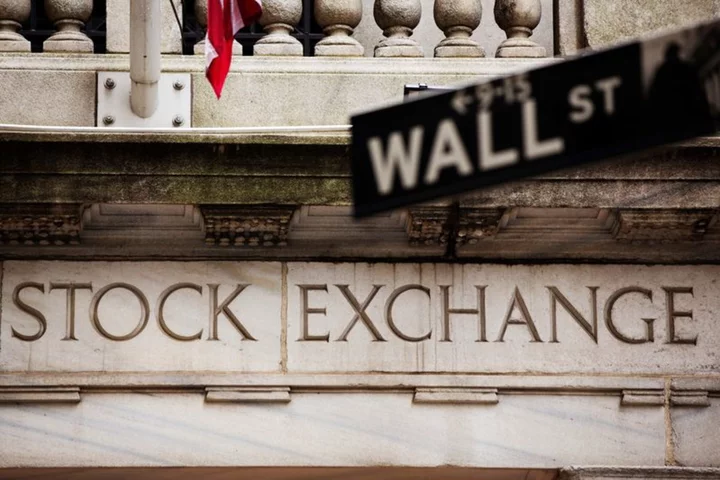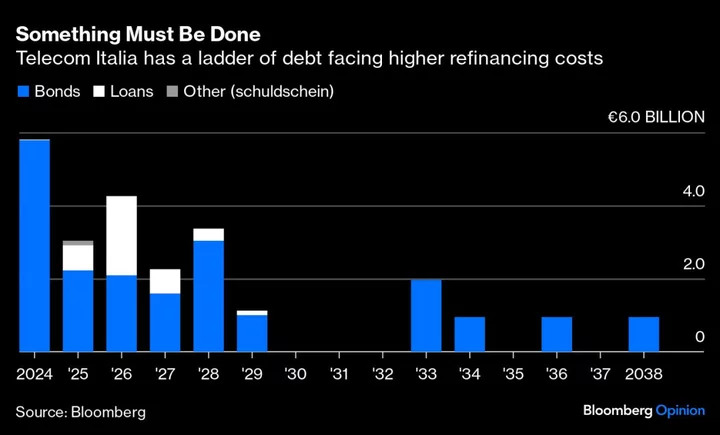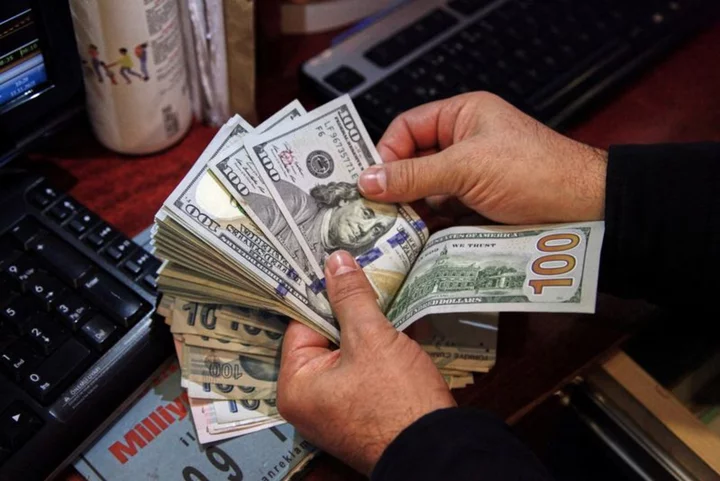A look at the day ahead in U.S. and global markets from Mike Dolan
After a hectic week deciphering a blizzard of economic and corporate updates and a bruising bond yield surge, world markets turn their focus back to Middle East tensions and another weekend of conflict.
Of central concern all week has been the seemingly limitless surge in long-term U.S. Treasury yields - with 10-year borrowing rates coming within one basis point of 5% on Thursday for the first time in 16 years, following 20-year and 30-year bonds through that threshold.
U.S. economic data on retail, industry and housing all show an economy in rude health or at least ahead of forecasts and the labour market is still tight as a drum. Atlanta Federal Reserve models have real GDP growth now roaring at 5.4%.
On top of that, early tallies of the corporate earnings season so far show 80% of S&P500 firms beating the Street and blended estimates of the aggregate annual profit gain for the whole 500 still holding pre-season forecasts of 1.6%.
But with the heat of all that, as well as the 17-day and counting hiatus in a speakerless Congress, the bond market appears to be running scared.
Markets looked to Fed boss Jerome Powell's appearance on Thursday for guidance on what the central bank does next - but might have been disappointed somewhat about his equivocation of the unfolding picture.
Powell said the economy's strength could require still tighter borrowing conditions to control inflation, but rising market interest rates may do some of the Fed's job.
Along with his deputies all week, the message on 'higher for longer' rates seemed clear, with the decision on whether to hike again being put off for at least a couple of months.
Dallas Fed cheif Lorie Logan added overnight that recent data and bond yield moves gave the central bank space. "We have some time," she said, on when the Fed may make the call.
Reactions in the market were curious, however, with implied Fed policy rates in the futures market and two-year Treasury yields easing back even as 10-year yields chomped at the 5% bit.
Some speculated that if the Fed was hesitant in pulling the rate trigger again now and the economy continues to race on, it may simply mean it has to keep things tight for much longer than markets had been betting over long-term maturities.
The resulting further disinversion of the yield curve to show the gap between two and 10-year yields at its lowest in a year is some testament to that. At the same time, worries about fiscal policy and debt supply have seen the risk premium on long-term maturities, the so-called term premium, rising.
But with another nervous weekend around the Israel-Gaza war ahead, when markets are closed or illiquid, Friday trading has shifted the focus back to short-term safety hedges.
That's helped pull 10-year Treasuries back about 8bps from 5%, returned a bid to U.S. crude oil back at two week highs and saw gold hit its highest since July.
Wall St futures remained in the red after the heavy losses on Thursday and the VIX volatility gauge hit its highest level since March at 21.66.
The dollar stayed buoyed and touched the 150 yen level seen at risk of drawing Bank of Japan intervention.
Chinese, Asian and European stocks all fell heavily.
In Europe, L'Oreal shares dropped 3% after it missed expectations for a strong rebound in China.
Key developments that should provide more direction to U.S. markets later on Friday:
* U.S. corporate earnings: American Express, Comerica, Huntington Bancshares, Regions Financial, Interpublic, Schlumberger
* Cleveland Federal Reserve President Loretta Mester and Philadelphia Fed President Patrick Harker both speak
* U.S.-EU summit in Washington. President Joe Biden meets with Charles Michel, president of the European Council, and Ursula von der Leyen, president of the European Commission
(By Mike Dolan, editing by Elaine Hardcastle mike.dolan@thomsonreuters.com. Twitter: @reutersMikeD)









